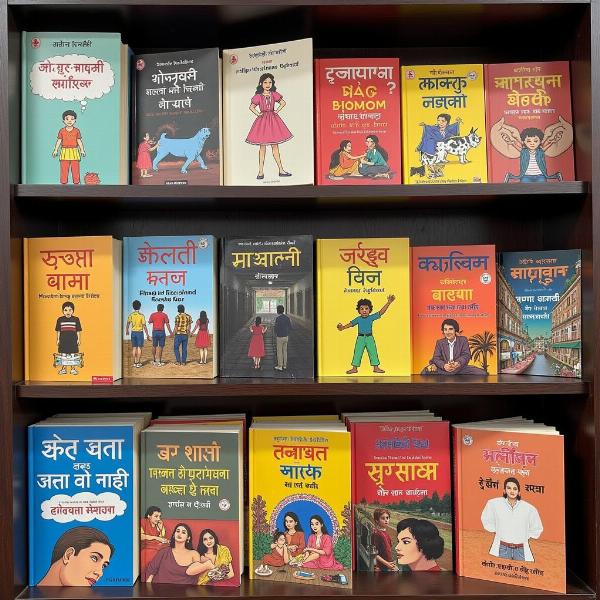Understanding the meaning of “paperback” in Hindi is crucial for anyone navigating the world of Indian literature, publishing, or even casual book conversations. This guide delves into the various Hindi translations of “paperback,” exploring their nuances and cultural contexts. We’ll also discuss the significance of paperbacks in the Indian market and how they compare to other book formats.
Decoding “Paperback” in Hindi
Several Hindi words effectively convey the meaning of “paperback.” The most common and widely understood translation is पेपरबैक (peparabaik), a direct transliteration of the English word. This term is easily recognizable and readily accepted across India.
Other translations include सस्ता संस्करण (sasta sanskaran), meaning “cheap edition,” and मुलायम आवरण वाला किताब (mulayam aavaran wala kitab), meaning “book with a soft cover.” These terms emphasize the affordability and physical characteristics of paperbacks, respectively. While less common than “peparabaik,” they provide a deeper understanding of what a paperback represents in the Indian context.
 Paperback Books in India
Paperback Books in India
Which term should you use? While “peparabaik” is universally understood, the choice depends on the specific context. In formal settings or when discussing literature, “peparabaik” is generally preferred. In casual conversations or when highlighting the affordability of the book, “sasta sanskaran” might be more appropriate.
The Rise of Paperbacks in India
Paperbacks have revolutionized the accessibility of books in India. Their affordability compared to hardcovers has made reading a more inclusive activity, reaching wider audiences across different socio-economic backgrounds. From classic literature to contemporary fiction, educational materials to self-help guides, paperbacks cater to diverse reading interests.
Paperbacks vs. Other Formats
How do paperbacks compare to other book formats available in India? While hardcovers are often perceived as more durable and prestigious, paperbacks offer portability and affordability. The rise of e-books and audiobooks presents another dimension. Although digital formats are gaining popularity, paperbacks retain their charm and accessibility, especially in areas with limited internet access.
Paperback’s Impact on Indian Literature
Paperbacks have democratized the literary landscape in India. They’ve enabled emerging authors to reach wider audiences and have fostered a vibrant reading culture. The lower production costs associated with paperbacks have allowed publishers to take risks on new voices and genres, leading to greater diversity in the Indian literary scene.
Conclusion: The Enduring Appeal of the Paperback
Whether you call it “peparabaik,” “sasta sanskaran,” or “mulayam aavaran wala kitab,” the paperback holds a significant place in Indian culture. Its affordability, portability, and accessibility have made it a beloved format for readers across the country. As the Indian literary landscape continues to evolve, the paperback remains a cornerstone of reading and storytelling.
FAQ
- What is the most common Hindi translation for “paperback”? The most common translation is पेपरबैक (peparabaik).
- Why are paperbacks so popular in India? Their affordability and accessibility are key factors contributing to their popularity.
- Are paperbacks still relevant in the age of e-books? Yes, especially in areas with limited internet connectivity.
- What is the difference between “sasta sanskaran” and “peparabaik”? While both refer to paperbacks, “sasta sanskaran” emphasizes affordability.
- How have paperbacks impacted Indian literature? They’ve made books more accessible and fostered a more diverse literary landscape.
- Where can I buy Hindi paperbacks? Bookstores, online retailers, and local markets are common sources.
- Are paperbacks considered less prestigious than hardcovers in India? While hardcovers might be seen as more prestigious, paperbacks are widely appreciated for their accessibility.
Meaning-Hindi.in is your trusted partner for professional Hindi translation services. We offer a comprehensive range of services, including business and commercial document translation, certified and legal document translation, technical and user manual translation, website and localization translation, educational and academic document translation, and express translation services. Our expertise in various specialized fields ensures accurate and culturally sensitive translations. Contact us today for all your Hindi translation needs. Email: [email protected] Phone: +91 11-4502-7584. Meaning-Hindi.in is your gateway to bridging the language gap.